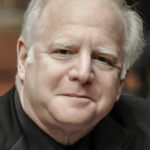Robert Baker, tenor; Corinne Byrne, soprano; Molly Orlando, piano; Andrew Kozar, trumpet; Marlanda Dekine, poet/speaker; Nurit Pacht, violin; Daniel Lippel, guitar; Caleb van der Swaagh, cello.
Douglas BOYCE: A Book of Songs
Douglas BOYCE: Scriptorium
Walter PISTON: Ars Poetica
New Focus FCR387
Formats: Digital
Release Date: December 8, 2023
Total Duration: 60:50
Giorgio Koukl | 8 DEC 2023
Just another digital release of a living composer with strange squeaky music?
No, please don’t make that erroneous assumption while contemplating the lovely cover art of The Bird is an Alphabet, a new album of works by American composer Douglas Boyce. This is top artistry from every point of view.
Boyce’s compositions often feature intricate textures, unconventional harmonies, and a willingness to explore new sonic possibilities. His work reflects a deep engagement with contemporary musical techniques while pushing stylistic boundaries and challenging traditional norms, but he also finds inspiration in Medieval and Renaissance traditions.
His use of dissonance and unique rhythmic structures adds complexity to his pieces, creating a distinct and innovative musical language. Boyce is also recognized for his attention to timbral details, creating rich and nuanced sonic landscapes within his works. Overall, his style goes far over the usual avant-garde composers, even if, in some works, he has a certain affinity to Dallapiccola and Berio.
But let us see the compositions in detail.
First of all, this album is blessed by the presence of two top voices: Robert Baker, a well-known tenor with an impressive list of world premiere recordings, and soprano Corinne Byrne, rightly famous for the ease with which she tackles the greatest difficulties of intonation and extension.
In the 17 tracks, we can follow three works, the first called A Book of Songs. Set for a tenor and piano, it divides itself into three movements: “A Feather for Voltaire,” “The Apple Orchard in October,” and “Cy Est Pourtraicte, Madame Ste Ursule Et les Unze Mille Vierges.” This last complicated title in medieval French probably comes from a legend about the martyrdom of Saint Ursula and her eleven thousand followers at the hands of the Huns. [1]
The music is spectacular, a real showcase for the pianist Molly Orlando, far beyond the usual in terms of technical difficulties. As said, the immensely expressive voice of Robert Baker adds much to the charm of this score. In the last movement, some extra-musical sources of piano sound are used, like chord rapping, glissandi on the soundboard, and similar effects. Here the danger of doing so only for the sake of a nice gadget is great, but fully avoided by the composer, who uses them in a very poetic way.
This work is definitely the best of the album.
A four-part composition called Scriptorium follows. Here, we have the chance to listen to the equally charming voice of Corinne Byrne. Versatile, very attractive in the low register, but extraordinary in the highest notes, which she reaches without any apparent effort.
The four parts, “Tyrian Purple,” “Orpiment,” “Lampblack,” and “Verdigris,” are quite unique in style and perfectly accompanied by the trumpet playing of Andrew Kozar.
Here again, the composer reaches the seemingly impossible task of creating a viable harmonic support out of a trumpet, an instrument of not so many expressive possibilities. The first part will leave you guessing what instrument it might be to produce such intriguing sounds.
The final work, on tracks 8 to 16, is Ars Poetica.
Here, we can follow the poet Marlanda Dekine recite five of her short works: “Wilderness,” “Returning,” “Out there,” “Reclamation,” and “Risk.”
All these quite short miniatures are interspersed by four purely instrumental intermezzi.
The quite monotonous voice of Ms. Dekine may not be the best choice to bring this per se good poetry to life; maybe a good actress would be a better choice.
Violinist Nurit Pacht, guiratist Daniel Lippel, and cellist Caleb van der Swaagh provide the accompaniment. They are doing their best but are a hint too disorganized to be really impressive.
So all in all, this is a fine way to discover the intimate and refined inner world of the composer Douglas Boyce, whose music probably never will be considered in the mainstream music industry but certainly deserves to be known to aficionados of 21st-century music. ■
EXTERNAL LINKS:
- [1] Saint Ursula (Wikipedia): en.wikipedia.org/wiki/Saint_Ursula
- Douglas Boyce: douglasboyce.net
- Robert Baker: corcoran.gwu.edu/robert-baker
- Corinne Byrne: corrinebyrne.com
- Molly Orlando: mollyorlando.com
- Andrew Kozar: andykozar.com
- Marlanda Dekine: marlandadekine.com
- Nurit Pacht: nuritpacht.com
- Daniel Lippel: danlippel.com
- Caleb van der Swaagh: calebvanderswaagh.com

Read more by Giorgio Koukl.








.png)